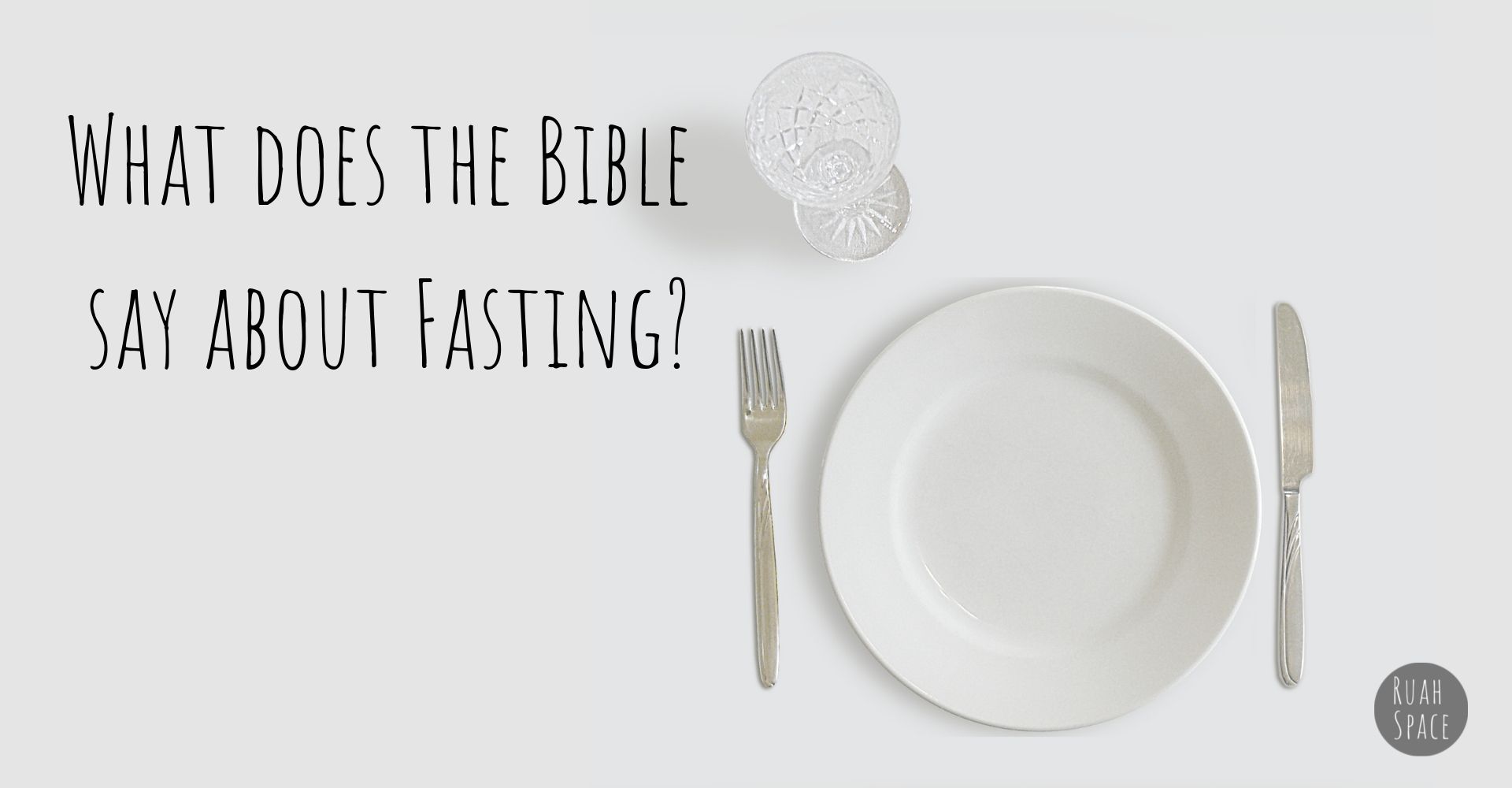Fasting is one of the most consistently practiced spiritual disciplines throughout the Bible. When we fast, we intentionally refrain from participation in something in order to create space, gain perspective, reorient, and focus on what truly matters. In the Bible, this often meant fasting from food, but we can fast any time we purposefully abstain from an action or a material object. We can fast from drinks, social media, complaining, television, spending money, or even sex in the case of 1 Corinthians 7 (Paul mentions a husband and wife consenting to such a fast for a time in order to be devoted to prayer but to come back together again).

When Jesus was teaching on fasting in the sermon on the mount, He said, “when you fast.”[1] He didn’t say, “if you fast.” He literally teaches about fasting with the assumption that it’s something we regularly do.
The object of fasting, however, is not to earn something, attract attention, or convince God of anything. Fasting is a prayerful discipline where we create space to listen, focus, and reorient our lives. We see people fasting throughout Scripture in order to gain a new perspective, grow in humility, repent of sin, or mourn a loss. God even says in Isaiah that a proper fast leads to practicing justice.
Fasting uniquely helps us to create space because it’s something we literally do with our bodies. It’s not a practice we simply do in our minds as if thinking good thoughts about not doing something will change us. Fasting is something we literally do with our entire being like lifting weights or going for a run. It shapes our mind, body, and spirit as we work through the deprivation of something important to us.
Fasting is a prayerful discipline where we create space to listen, focus, and reorient our lives.
With this new space or time, we then intentionally listen, pray, and reflect upon the object or experience we are fasting from. We notice how we feel, what we are thinking, and pay special attention to what God might be saying in the moment. We return to a complete reliance upon God.
A New Perspective
We humans lose perspective on things quite easily. We frequently get too close to things or allow them to become so important we miss the fact that we have become reliant on them in an unhealthy way. Instead of being free in Christ, we end up in bondage to our stuff. We become addicted even when we don’t realize it. Of course, there are many things we literally need in order to survive such as food and water. Even these things, however, can end up becoming our masters if we aren’t careful.
Consider how difficult it can be, for example, to cut out sugar, or stop drinking coffee. Or think about how difficult it can be to go without checking social media, email, or the news. Of course, this isn’t to say that these things are completely bad or we should never engage with them. It is to say, however, that we can easily end up relating to them in unhealthy ways. The only way to discover the true place such things hold in our life is to step back from them for a time.
This is why Jesus says in the desert during his time of temptation, “Man shall not live on bread alone, but on every word that comes from the mouth of God.”[2] He had been fasting for forty days from food and the Gospel tells us that he was hungry. Satan tempts Jesus to turn stones into bread, but Jesus points out that there is more to life than bread, even though he desired physical bread at that moment.
Jesus isn’t saying bread is bad. God created bread. Jesus uses bread to represent His own body at the Last Supper. What Jesus is saying is that our true sustenance, joy, peace, and fulfillment come from God. We should eat, but if eating becomes a crutch or the thing that we believe can fulfill us or fully provide for us, it’s no longer in its proper place.
You will know if you rely on something in an unhealthy way if you can’t go without it or turn it off for a couple of days…
The truth is this can happen with anything. We can become attached to food, drink, technology, or anything under the sun in such a way that it becomes more than something we simply engage it, but something we rely on. You will know if you rely on something in an unhealthy way if you can’t go without it or turn it off for a couple of days (or even a couple of hours).
Fasting helps us regain a proper perspective. It’s not to say you will never go back to the food or the experience, although that might be necessary if it’s something that is ruining your life, but to set it aside for a time so that you can engage it in a healthy way again.
Fasting creates the space for wisdom to grow and for us to regain control. Fasting helps us not just know, but literally experience, that only God can truly and fully provide for us. When we go without the thing we are fasting from, it may feel impossible or difficult, but like Jesus, we will come to see that we were really searching for God all along. And the Good News is that God is always available. Fasting helps create the space for us to experience this truth and enter into it.
Humility
Psalm 35:13 says, “yet when they were ill, I put on sackcloth and humbled myself with fasting.”[3] In this instance, the Psalmist fasts in order to gain a proper understanding of their own life in relation to others and God. Humility is when we understand how much we rely on God and on others and that there is no such thing as a self-made person. We didn’t determine when and where we were born, how we would look, or what time we would be born in. We can’t give ourselves the gift of breath or save ourselves physically or spiritually. It’s easy, however, to come to believe that we are in control or that the world revolves around our wants and needs.
Fasting reminds us how little we control and how life isn’t ultimately about our own comfort. It reminds us of the reality that we rely on God and others for everything. This isn’t meant to be depressing or to be an excuse for giving up, but to say that we are called to love, serve, and live in such a way that we reflect the fact that everything is a gift we didn’t earn. It’s actually freeing because we can be who God made us to be without any need for pretense.
Fasting helps us not just know, but literally experience, that only God can truly and fully provide for us.
When we intentionally deprive ourselves from something in order to make space for God and what truly matters, we recognize how much we rely on certain things, and we are reminded of our ultimate reliance each and every moment on God. It humbles us to realize that we aren’t the most important. Life isn’t all about us. We don’t have it all together. It reminds us that we are humans made in the image of God and deeply loved by God, but we aren’t God. We are invited to love as God has loved us, serve as God has served us, and testify to the Good News that God is God and we are created in God’s image.
Repentance
Fasting is also used as a means of repentance throughout Scripture. In the book of Jonah, for example, when the king of Nineveh recognizes his sins and the sins of his people before God, he proclaims, “Do not let people or animals, herds or flocks, taste anything; do not let them east or drink. But let people and animals be covered with sackcloth. Let everyone call urgently on God. Let them give up their evil ways and their violence. Who knows? God may yet relent and with compassion turn from his fierce anger so that we will not perish.”[4]
I have always found it hilarious that even the animals fast and are covered with sackcloth. Can’t you imagine the donkeys thinking, “What did we ever do? Give us back our water!” The king recognizes the great injustice he and his people have perpetuated. They have lived violently and in ways that harm others.
When they recognize the gravity of their mistakes, thinking how sorry they are isn’t enough. They needed to express physically their lament and their intention to change. It’s not so much that the fasting earns the forgiveness from God, but it was the most honest and meaningful way they could express their sorrow over their past.
As humans, we are created to be physical, mental, and spiritual. We cannot separate the three. In the modern world, however, many certainly try. Especially in the west, we have placed the mind above all else, as if as long as we think the right things, we are ok. The truth is, it’s all connected. This is why so frequently throughout the Bible, people manifest their internal thoughts and emotions physically. They recognize that they need to get their entire being involved.
It’s not so much that the fasting earns the forgiveness from God, but it was the most honest and meaningful way they could express their sorrow over their past.
Fasting, therefore, becomes a way for us to fully enter into lament and repentance. We cease an activity or cease partaking of a certain food or drink, so that we can create space to fully feel what we need to feel, express to God what needs to be expressed, and hear from God what we need to hear. Fasting simply helps create the space, physically and mentally, to truly do what we need to do.
Mourning
Similar to fasting as a part of repentance, we also see people in Scripture fasting as a part of mourning. In 2 Samuel for example, when David hears that Saul and his son Jonathan are dead, we are told, “David and all the men with him took hold of their clothes and tore them. They mourned and wept and fasted till evening for Saul and his son Jonathan, and for the army of the LORD and for the nation of Israel, because they had fallen by the sword.”[5]
Frequently in life, words simply aren’t enough. We can’t talk our way through what we are feeling. We need a way to express it. This is why some people find crying or shouting to be helpful. We need to get it out physically. Fasting is another tool for this. We express and experience what we are feeling in a tactile way. It gets it out of our head and into and out of our bodies. In the case of David, fasting from food was also likely a physical expression of the loss of something so close to him. How could he possibly eat and experience the joy of food when it felt like all joy had been lost?
By entering into this discipline, David and his men honored what they were experiencing and created space to truly enter into and go through their grief. Through this practice, they created space to experience the presence and comfort of God with them.
Justice
One of the most interesting passages related to fasting in the Bible comes from the book of Isaiah. God is quite upset with how God’s people have been acting, and he calls them out on their fasting practices. The people had asked God, “why have we fasted…and you have not noticed?”[6] God responds with, “On the day of your fasting, you do as you please and exploit all your workers. Your fasting ends in quarreling and strife, and in striking each other with wicked fists. You cannot fast as you do today and expect your voice to be heard on high…Is this not the kind of fasting I have chosen: to loose the chains of injustice and untie the cords of the yoke, to set the oppressed free and break every yoke? Is it not to share your food with the hungry and to provide the poor wanderer with shelter-when you see the naked, to clothe them, and not to turn away from your own flesh and blood?”[7]
God’s issue with the people is that they are going through the motions of the fast, but their only concern is themselves. They aren’t paying attention in the least to those who are suffering, to those who need their help. Throughout the Bible, one of the most important issues for God is justice. God’s people are constantly called to love the poor, oppressed, widow, orphan, immigrant, and enemy. Even if we go through the right “religious” motions, if we don’t love and care for those who are suffering, God doesn’t want any of it.
The fast God desires is a spiritual discipline where we sacrifice what we think we need and desire so that someone else can have what they need and desire.
Fasting, therefore, is also meant to create space to remind us of and open us to those who are suffering. We aren’t called to be the savior but to simply love and serve as we have been loved and served. The fast God desires is a spiritual discipline where we sacrifice what we think we need and desire so that someone else can have what they need and desire. We give some, or even all, of what we have to and for someone else. We give not because we are better or more able, but because it’s all a gift that belongs to God and we are invited to share that Good News with the world.
Invite to Fast
Fasting is one of the most beautiful invitations of the Bible with the potential to truly shape us. When we can go without something for a day, a week, or even 40 days, we can grow closer to God, grow as people of wisdom, interact with the world in more healthy and life giving ways, practice justice, and express what is inside of us in real, tangible ways.
Brothers and sisters, may you fast, and may you experience the blessing and connection that comes whenever you create space for what truly matters.
So wherever you might be today, consider what it might look like to make fasting a normal part of your daily, weekly, or monthly rhythm. How can you step back in order to make space for the Spirit? What might you need to set aside so that you can be free again? Where do you need to literally experience the life-sustaining gift of the love of God? What do you need to trust God with again? How might you create more space to hear God’s voice in the midst of the clutter and distractions?
Brothers and sisters, may you fast, and may you experience the blessing and connection that comes whenever you create space for what truly matters.
[1]Matthew 6:16
[2]Matthew 4:4
[3]Psalm 35:13
[4]Jonah 3:7-9
[5]2 Samuel 1:11-12
[6]Isaiah 58:3
[7]Isaiah 58:3-4, 6-7





